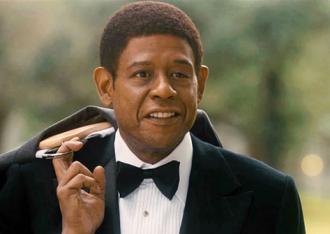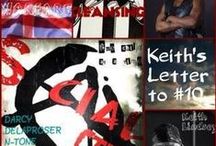reviews the new film The Butler,
which tells the story of a Black White House butler, with the struggle
for racial equality over the 20th century as the backdrop.

Forest Whitaker stars in Lee Daniels' The Butler
Warning: This review contains plot spoilers.
LEE DANIELS' The Butler opened last weekend at number one at the box office. It's simultaneously the story of one man and of an entire generation that lived through the momentous changes of the civil rights era. Achieving this balance is difficult, and at times the film falls flat, but overall, it's a gripping story, and one that will hopefully inspire new generations to learn more about this crucial history than one movie could possibly offer.
The Butler was inspired by the life of Eugene Allen, a White House butler who served through eight presidential administrations, though most of the personal history is fictional. In the film, Cecil Gaines, played brilliantly by Forest Whitaker, grew up on a cotton plantation in 1920s Georgia. Viewers are almost immediately faced with the brutality of the Jim Crow South when a young Cecil's mother is raped and his father murdered by the plantation owner.
This sets the backdrop for Cecil's entrance into domestic service, where he learns the art of being "two-faced"--presenting a carefully constructed mask in front of his white employers--such that "the room should feel empty when you're in it."
Cecil's character thus offers an interesting perspective on 20th century race relations, from the point of view of those who shared a much more intimate, though fundamentally subservient, relationship with whites--and in this case the most powerful white men in the nation.
As a fictional Martin Luther King Jr. remarks at one point in the film, "The Black domestic played an important role in our history." Reflecting on how their hard work and quiet dignity undermined the dominant stereotypes of Black people, King reflects, "In many ways, they are subversive without even knowing it."
Review:
Movies
The Butler , directed by Lee Daniels, starring Forest Whitaker, Oprah Winfrey and David Banner.
This convenient pairing of historical and personal narratives--including having a younger son die in the Vietnam War for good measure--feels far too contrived. Nonetheless, the actors manage to wrest some compelling human drama from the larger-than-life events against which their lives unfold.
Oprah Winfrey gives a stunning performance as Cecil's wife, who, owing to her husband's success, is elevated to the role of housewife, yet struggles with loneliness and alcoholism as a result.
- - - - - - - - - - - - - - - -
THE CENTRAL tension in the film is between Cecil and his son. Viewers can sympathize both with Louis' growing frustration with his father's passive acceptance of injustice as well as Cecil's incomprehension that his son would reject the better life he worked so hard to provide for him and instead risk his life for a cause that was seemingly unwinnable. When Louis tells his father that something special is going on in the South, Cecil responds, "What's so special about another colored man in jail?"
The depictions of the early student movement are the most powerful historical aspects of the film. When we are so often offered a sanitized version of the civil rights struggle, Daniels succeeds admirably in capturing the harrowing viciousness of the Southern racists and the unbelievable courage and determination required of the student activists in response.
Less compelling are the later portrayals of the Black Panther Party activists who come across as somewhat of a joke with their funny hair and thirst for vengeance. Overall, the ambitious scope of the timeline makes it difficult to delve into dynamic evolution of the Black freedom movement in more than a cursory manner.
From the vantage point of White House butler, the film does offer the opportunity to register each successive president's reactions--both personal and public--to the growing struggle. Although the impressive array of actors strive admirably to capture these presidential personas, too often, the depictions are played mainly for laughs--such as Liev Schreiber's Lyndon B. Johnson barking out profanity-laced orders while seated on the toilet.
Nonetheless, it's clear that rather than leading the calls for change, the presidents are mainly in the position of reacting to the movement from below. While he's initially reluctant to intervene, John Kennedy is given far too much credit for having a personal change of heart.
What could have been a useful opportunity to explore the administration's attempt to contain and co-opt the civil rights movement--for instance, Robert Kennedy's intervention to try and divert the student movement from civil disobedience into voter registration drives--instead devolves into an ahistorical sentimentality.
- - - - - - - - - - - - - - - -
IT'S UNDER Ronald Reagan that Cecil finally fully grasps the hypocrisy of the presidents he works for and the significance of his son's activism. Reagan was a master of doling out the symbolic gesture to cover up the systemic attack. We see him for instance on a secret mission to send out money to people who write him for help, while on a policy level working to dismantle the welfare state.
He's the president who finally grants Cecil and his fellow Black workers equal pay and invites Cecil to a White House dinner in recognition of his advocacy. It's at this dinner that Cecil comes to terms with the hollowness of this gesture, and the immensity of the struggle that made even that possible.
The end of the film skips ahead to a much older Cecil and his son campaigning for Barack Obama. This is arguably the most problematic part of the film. Cecil's euphoria at the election of the country's first Black president, shared by millions of African Americans, is certainly understandable and poignant. However, in a movie coming out while Obama is still in office, it smacks too much of propaganda.
http://socialistworker.org/2013/08/28/while-they-protested-he-served
Most troubling is the implication, or at least the lack of evidence to the contrary, that racism is now a thing of the past. This is likely not the intention of Daniels or the other actors in the film--surely Forest Whittaker, who experienced racial profiling himself earlier this year when he was accused of shoplifting at a New York deli, doesn't believe this to be true.
However, there's a real danger that for white audiences, who recent polls show have a much different perception of the persistence of racism than Blacks, this ending will help reinforce the myth of the so-called post-racial society.
Hopefully, that won't be the case. The past few years have seen a growing awareness of how deeply racist this country remains, and a groundswell of activism around the shooting of Trayvon Martin and many other aspects of the racist criminal injustice system.
Last weekend saw many of these activists converge for the 50th anniversary of the March on Washington. In that sense, the civil rights activists portrayed in the film can help serve as an inspiration to those of us who continue the struggle for justice today.

No comments:
Post a Comment